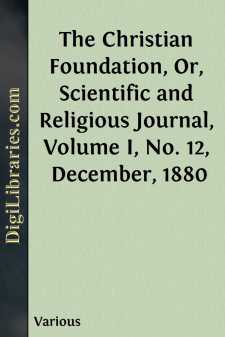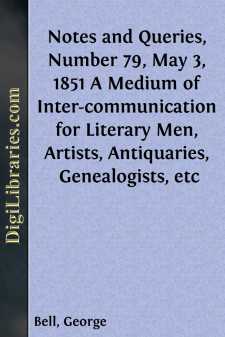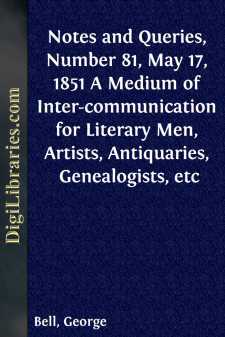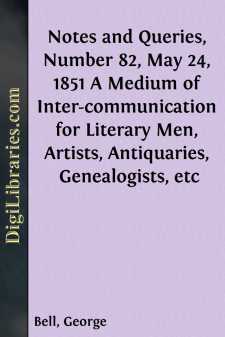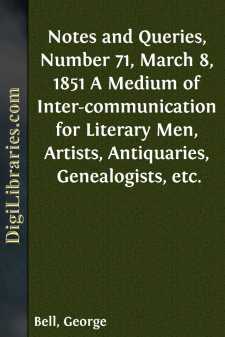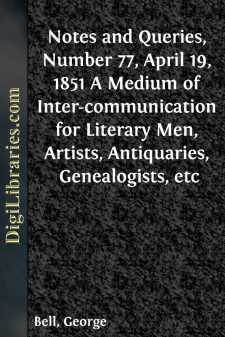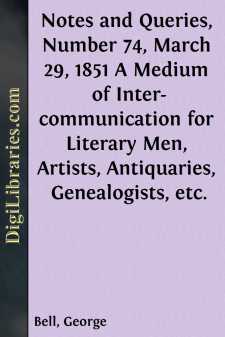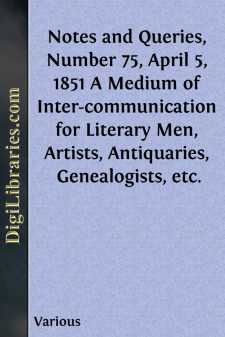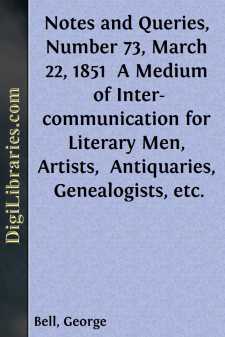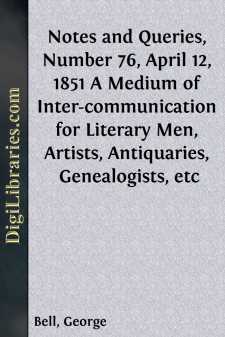Periodicals
- Art 27
- Children's periodicals 59
- Entertainment 5
- Food/Wine 2
- Games/Humor 455
- General 661
- Health 1
- History 53
- House/Home 1
- Regional 62
- Science/Nature 118
- Transportation 10
Periodicals Books
Sort by:
by:
Various
IS THE SINNER A MORAL AGENT IN HIS CONVERSION? There are a great many questions asked upon the subject of conversion, and as many answers given as there are theories of religion, and many persons listening to men's theories upon this subject are left in doubt and darkness in reference to what is and is not conversion. You ask the Mormons, who fully believe their theory of conversion, and they will...
more...
by:
George Bell
The Arke of Artificial Day. Before proceeding, to point out the indelible marks by which Chaucer has, as it were, stereotyped the true date of the journey to Canterbury, I shall clear away another stumbling-block, still more insurmountable to Tyrwhitt than his first difficulty of the "halfe cours" in Aries, viz. the seeming inconsistency in statements (1.) and (2.) in the following lines of the...
more...
by:
George Bell
Notes. ILLUSTRATIONS OF CHAUCER, NO. VI. Unless Chaucer had intended to mark with particular exactness the day of the journey to Canterbury, he would not have taken such unusual precautions to protect his text from ignorant or careless transcribers. We find him not only recording the altitudes of the sun, at different hours, in words; but also corroborating those words by associating them with physical...
more...
by:
George Bell
NOTE UPON A PASSAGE IN "MEASURE FOR MEASURE." The Third Act of Measure for Measure opens with Isabella's visit to her brother (Claudio) in the dungeon, where he lies under sentence of death. In accordance with Claudio's earnest entreaty, she has sued for mercy to Angelo, the sanctimonious deputy, and in the course of her allusion to the only terms upon which Angelo is willing to remit...
more...
by:
George Bell
ON TWO PASSAGES IN "ALL'S WELL THAT ENDS WELL." Among the few passages in Shakspeare upon which little light has been thrown, after all that has been written about them, are the following in Act. IV. Sc. 2. of All's Well that Ends Well, where Bertram is persuading Diana to yield to his desires: "Bert. I pr'ythee, do not strive against my vows: I was compell'd to her; but...
more...
by:
George Bell
LATIN DRINKING SONG BY RICHARD BRAITHWAIT. I have been surprised, from the facility with which the author of "Drunken Barnaby" seems to pour out his Leonine verse, that no other productions of a similar character are known to have issued from his pen. I am not aware that the following drinking song, which may fairly be attributed to him, has ever appeared in print. It was evidently unknown to...
more...
by:
George Bell
ON PORTRAITS OF DISTINGUISHED ENGLISHMEN. In submitting to you the following brief observations, it is neither my wish nor intention to undervalue or disparage the labours of Horace Walpole, and Granger, and Pennant, and Lodge, and the numerous writers who have followed in their train, and to whom we are so much indebted for their notices of a great variety of original portraits of distinguished...
more...
by:
Various
TWO CHANCELLORS. Although neither your readers nor I are politicians enough to interfere in the changes proposed with reference to the office of Lord Chancellor, I doubt not that some of them, now the subject is on the tapis, may feel interested in a fact connected with it, which our ancient records disclose: namely, that on one occasion there were two chancellors acting at the same time for several...
more...
by:
George Bell
SUGGESTIONS FOR PRESERVING A RECORD OF EXISTING MONUMENTS. When, in the opening Number of the present Volume (p. 14), we called the attention of our readers to the Monumentarium of Exeter Cathedral, we expressed a hope that the good services which Mr. Hewett had thereby rendered to all genealogical, antiquarian, and historical inquirers would be so obvious as to lead a number of labourers into the same...
more...
by:
George Bell
To judge of this question fairly, it will be necessary to cite the passage in which it occurs, as it stands in the folio, Act III. Sc. 8., somewhat at large. "Eno. Naught, naught, all naught! I can behold no longer; Th' Antoniad, the Egyptian admiral, With all their sixty, fly, and turn the rudder; To see't, mine eyes are blasted. Enter Scarus. Scar. Gods and goddesses, all the whole...
more...


